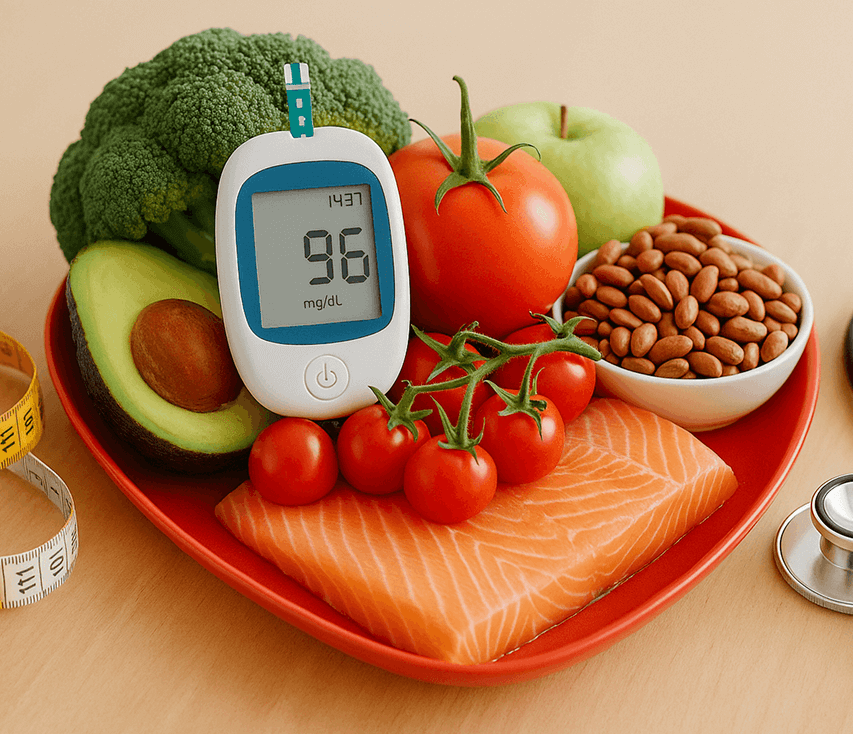India is facing an escalating diabetes epidemic, with over 74 million adults affected as of 2021. Experts warn that this number could exceed 124 million by 2045, with the majority suffering from Type 2 diabetes. This alarming trend highlights a growing concern about blood sugar imbalances, not only among those diagnosed with diabetes but also for the general population. Blood sugar fluctuations can impact daily life, influencing energy levels, mood, and mental clarity, making it crucial to address blood sugar balance as a preventive measure.
The Impact of Blood Sugar Fluctuations
When we talk about blood sugar, we’re referring to the amount of glucose circulating in our bloodstream. Our body relies on blood sugar to fuel daily functions, but when glucose levels spike and crash unexpectedly, the consequences go beyond just physical discomfort. These rapid fluctuations can contribute to fatigue, irritability, mood swings, and brain fog, all of which significantly affect an individual’s quality of life.
Blood sugar spikes and crashes are most commonly triggered by consuming foods high in refined carbohydrates and sugars. These types of foods cause glucose to flood the bloodstream rapidly, leading to an immediate surge in insulin production. Once the insulin clears the sugar from the bloodstream, the body experiences a sharp dip in glucose levels, known as reactive hypoglycemia. This crash often results in fatigue, hunger, and cravings for quick energy sources, perpetuating a vicious cycle of poor dietary choices.
Over time, consistent blood sugar fluctuations increase the risk of insulin resistance, which is a significant precursor to Type 2 diabetes. Insulin resistance occurs when the body’s cells no longer respond to insulin effectively, forcing the pancreas to produce more insulin to compensate. This, in turn, leads to higher insulin levels in the bloodstream and increased blood sugar levels, creating a harmful loop that can be difficult to break.
Given this, blood sugar balance should be a priority for everyone, whether or not they have been diagnosed with diabetes. Stabilizing blood sugar can not only improve energy levels but also promote better mood, mental clarity, and overall well-being.
Understanding the Mechanisms Behind Blood Sugar Fluctuations
The body’s natural response to a meal rich in simple sugars or refined carbohydrates is the rapid absorption of glucose, which leads to a sharp spike in blood sugar. In response, the pancreas releases insulin, a hormone responsible for helping cells absorb glucose. However, in people who regularly consume high-glycemic foods, the body becomes overwhelmed, leading to the release of excess insulin, which can ultimately cause a rapid drop in blood sugar levels.
This drop is the hallmark of reactive hypoglycemia, which occurs when blood sugar levels fall too quickly. Symptoms such as fatigue, irritability, anxiety, and hunger often follow. Unfortunately, this drop in blood sugar encourages the body to crave more sugary or carbohydrate-rich foods, further perpetuating the cycle of blood sugar instability.
This cycle, when repeated over time, can lead to a significant dysfunction in how the body processes glucose. The result is the development of insulin resistance, a condition where the cells become less responsive to insulin, requiring more of it to manage blood sugar levels. Eventually, this condition can lead to Type 2 diabetes, a chronic condition with severe implications for long-term health.
The Importance of Blood Sugar Balance for Overall Health
Beyond the obvious impact on physical health, blood sugar balance plays a critical role in mental health. Unstable blood sugar levels can result in mood swings, irritability, and cognitive issues like brain fog. Many individuals find themselves fatigued or struggling to focus due to fluctuating glucose levels. Therefore, maintaining stable blood sugar levels isn’t just important for managing diabetes but is also crucial for sustaining energy, improving mood, and optimizing mental clarity.
In fact, research has shown that blood sugar imbalances are linked to mental health issues such as anxiety and depression. A 2018 study published in the journal Psychoneuroendocrinology found that individuals with unstable blood glucose levels were more likely to experience mood disorders. These findings highlight the interconnectedness of physical and mental health and the importance of maintaining blood sugar stability for overall well-being.
Nutritional Strategies for Stabilizing Blood Sugar
Managing blood sugar begins with a balanced and mindful diet that prioritizes whole foods over processed ones. By incorporating fiber, protein, complex carbohydrates, and healthy fats into each meal, individuals can achieve more consistent blood sugar levels, which helps prevent the rollercoaster ride of energy spikes and crashes.
- Fiber
Fiber is one of the most important nutrients when it comes to blood sugar regulation. It slows down the absorption of glucose in the bloodstream, preventing rapid spikes. Foods high in fiber, such as whole grains, legumes, fruits, and vegetables, help to maintain stable glucose levels and reduce insulin spikes. Fiber-rich foods also promote satiety, preventing overeating and unnecessary snacking. - Protein
Protein plays a critical role in balancing blood sugar by providing sustained energy and helping to reduce hunger. Including protein-rich foods like eggs, poultry, dairy, lentils, and fish in your meals can prevent the sudden hunger pangs that often lead to unhealthy food choices. Protein also helps in muscle building and repair, making it an essential nutrient for maintaining metabolic health. - Complex Carbohydrates
Unlike refined carbohydrates, which break down quickly and cause blood sugar spikes, complex carbs are digested more slowly, leading to a gradual release of glucose into the bloodstream. Whole grains such as quinoa, brown rice, oats, and starchy vegetables like sweet potatoes and legumes provide steady energy without causing rapid fluctuations in blood sugar levels. - Healthy Fats
Healthy fats help to regulate blood sugar levels by slowing the digestion process and promoting satiety. Sources of healthy fats include nuts, seeds, olive oil, and avocados. These fats also support brain function and hormone regulation, both of which are critical for overall health.
Lifestyle Tips for Blood Sugar Balance
In addition to making smart dietary choices, certain lifestyle habits can also play a role in stabilizing blood sugar levels. These practices can help individuals manage their energy levels, improve mood, and reduce the risk of developing insulin resistance.
- Food Sequencing
Food sequencing is a simple but effective strategy that can help regulate blood sugar levels. The idea is to eat foods in a specific order to reduce blood sugar spikes. Start with protein or non-starchy vegetables, followed by carbohydrates, and finish with healthy fats. This strategy helps slow the absorption of glucose and prevents rapid spikes in blood sugar. - Apple Cider Vinegar
Apple cider vinegar has been shown to help regulate blood sugar responses after meals. Consuming a small amount of apple cider vinegar diluted in water before meals may improve insulin sensitivity and reduce post-meal glucose spikes. - Exercise
Physical activity is one of the most effective ways to regulate blood sugar levels. Engaging in regular exercise helps the body use insulin more effectively and promotes glucose uptake by the muscles. Even a quick walk after meals can significantly reduce post-meal blood sugar spikes. - Avoid Snacking
Frequent snacking can lead to consistently elevated insulin levels, which disrupt the body’s natural fat-burning and repair processes. Instead, try to keep longer gaps between meals to allow the body to return to a baseline and improve insulin sensitivity. - Sleep and Stress Management
Both poor sleep and chronic stress can lead to imbalances in blood sugar regulation. Lack of sleep can increase insulin resistance, while stress hormones like cortisol can elevate blood sugar levels. Prioritize quality sleep and practice stress-reduction techniques such as deep breathing, yoga, or meditation to help maintain stable glucose levels.
Herbal and Supplement Support for Blood Sugar Balance
Several herbs and supplements have been shown to support blood sugar balance and improve insulin sensitivity. Incorporating these into your routine can be a beneficial addition to dietary and lifestyle changes.
- Berberine
Berberine, a compound found in several herbs, has gained attention for its ability to improve insulin sensitivity and regulate blood sugar. It has been shown to activate AMPK, an enzyme that helps manage glucose metabolism, and is often used as a natural alternative to metformin for those with insulin resistance. - Cinnamon
Cinnamon has been used for centuries to help regulate blood sugar levels. It works by enhancing the ability of cells to respond to insulin, which improves glucose uptake. Ceylon cinnamon is considered the best type for health benefits due to its lower levels of coumarin, which can be harmful in high doses. - Turmeric
Curcumin, the active compound in turmeric, has anti-inflammatory properties that can support blood sugar regulation. Incorporating turmeric into your meals or drinking turmeric tea may help reduce insulin resistance and improve overall blood sugar control.
Conclusion
India’s diabetes crisis is a growing concern, but it is not an insurmountable one. By adopting mindful dietary habits, practicing regular physical activity, and managing stress, individuals can maintain stable blood sugar levels, improving their energy, mood, and overall health. Preventing blood sugar imbalances is not only crucial for diabetes prevention but also for sustaining mental clarity, emotional stability, and long-term well-being. Through small, sustainable lifestyle changes, individuals can take proactive steps toward a healthier future, free from the energy dips, mood swings, and health risks associated with unstable blood sugar levels.




